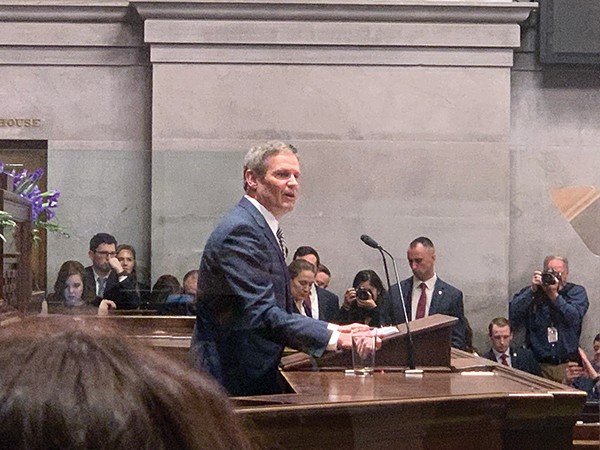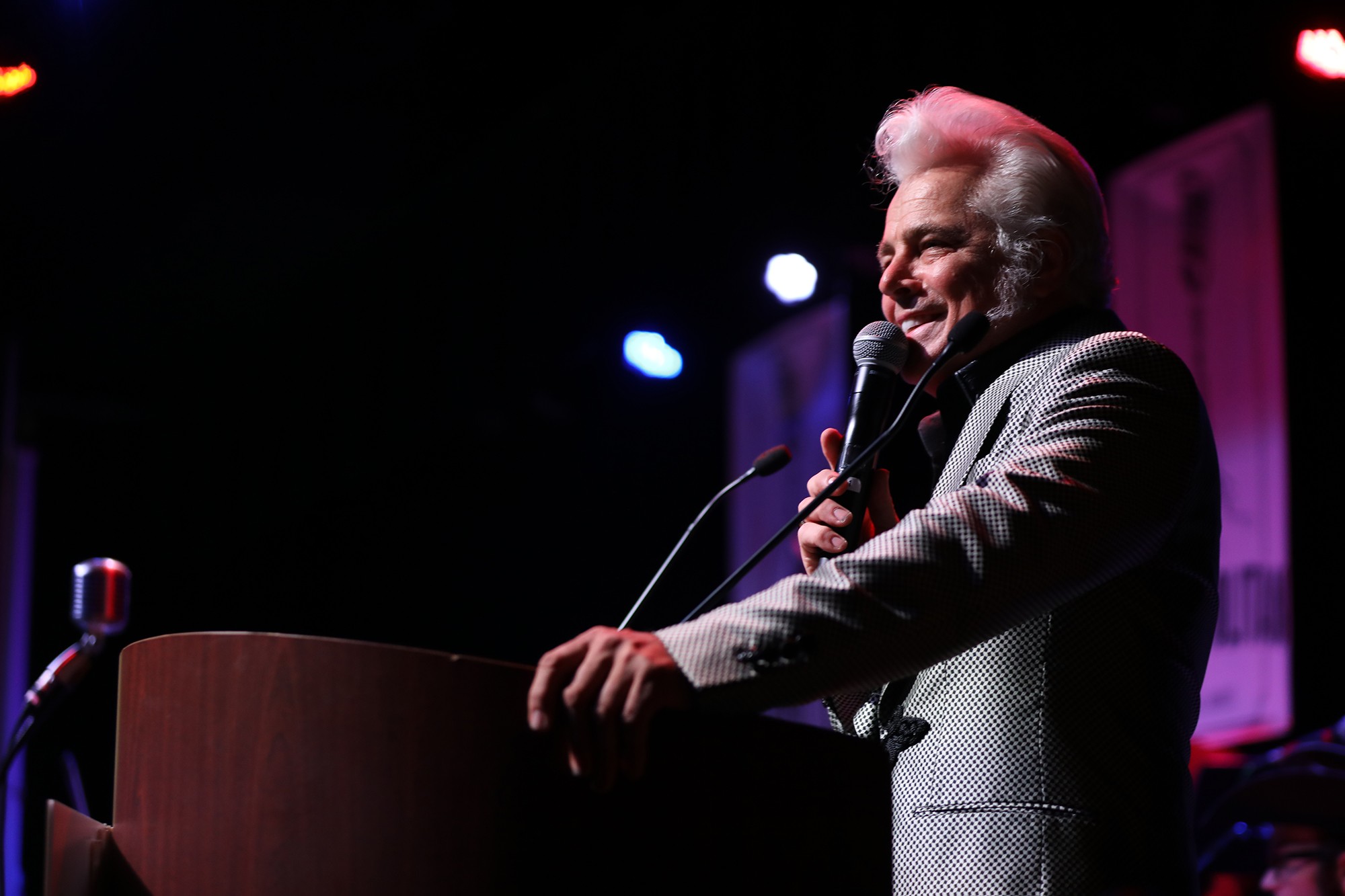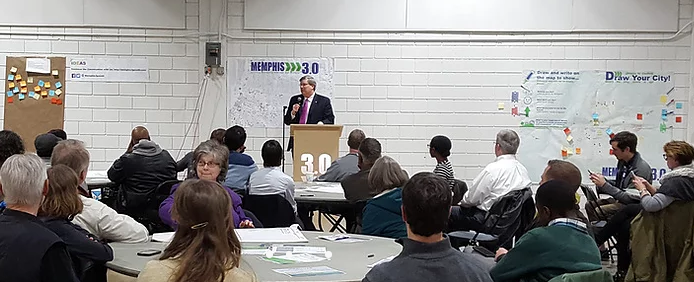 Jackson Baker
Jackson Baker
Governor Bill Lee, giving the State of the State Address
On Monday evening, March 4, Governor Bill Lee delivered his first State of the State address in the chamber of the state House of Representatives in Nashville. Below is the complete text of his remarks:
Lieutenant Governor McNally, Speaker Casada, Speaker Pro Tem Haile, Speaker Pro Tem Dunn, Members of the 111th General Assembly, Justices, Constitutional Officers, friends, guests, fellow Tennesseans:
Tennessee’s voters and its constitution have given me the responsibility of delivering this address evaluating where we are as a state and recommending action to make us even better.
I am grateful for this opportunity to serve, and it is my high honor to be here tonight.
There’s a scripture that encourages us to consider others as more important than ourselves.
Before I begin tonight, I’d like to acknowledge the woman in my life who embodies that most, my wife and the first Lady of Tennessee, Maria.
You and I have a First Lady who is deeply committed to serving this state purposefully and she challenges me every day to likewise govern with purpose.
Thank you, Maria. I love you.
And let me say welcome and thank you to my Cabinet, and my staff; you’re doing an excellent job and you make us all proud.
The year my oldest daughter Jessica turned 16, she and I took a father-daughter trip for her birthday. We had both been through some very personal and tragic struggles and we decided to do something that would be “overcoming.”
We travelled to Wyoming to the Grand Teton National Park to climb one of the tallest mountains in the United States.
We travelled to Wyoming to the Grand Teton National Park to climb one of the tallest mountains in the United States.
It’s a difficult and technical climb, and we spent months preparing both physically and mentally.
The apex of our trip would carry us to 14,000 feet above sea level. Our first day we hiked up to 11,000 feet to make our camp for the night.
As we neared the basecamp, our guide, probably sensing my nervousness, pulled me aside and said something very important.
He said, “You need to make a decision that you’re going to make this climb before you get to the base camp.
“Because when you get there you’re going to look up at the Grand Teton, and it’ll look like a massive granite spire that sticks straight up higher than you ever imagined, and you’ll feel very intimidated.
“If you have the tiniest doubt in your mind that you can do it as you’re hiking up there today, then once you stand at the base camp tonight and look up, you’ll be convinced that you can’t possibly climb that thing.”
He told me I needed to decide right then and there whether I was going to finish the climb.
I did decide, and we did finish and let me tell you, like everything that’s difficult, the view from the top was well worth the climb.
As a state, our challenges, too, are difficult, and the climb will require great effort, but Tennessee is a remarkable place, with remarkable people.
Now, I think we can all agree that while important things happen in the halls of government it is actually what happens outside these walls that makes Tennessee truly great.
Nearly every Friday since we took office, Maria and I have left this building to meet Tennesseans in their communities to learn more about what makes our state work.
We met a soybean farmer in Lauderdale County who navigates the Mississippi floodwaters to pull in a harvest and carry on our proud agricultural tradition.
We met a third-grade teacher in North Nashville who works over time to ensure their students are reading at grade level and continue to be the fastest improving students in the nation.
We met a small business owner in Jamestown who employs fellow neighbors and keeps the backbone of the Tennessee economy running strong.
And so, as a lifelong Tennessean, when I reflect on our state, I see her people and I am filled with pride.
To our elected leaders in this room and the many Tennesseans watching from their homes, I am proud to report after seeing with my own eyes: the state of our state is hopeful, prosperous, and strong.
God has truly blessed us — our economy is growing, our schools are improving, our natural resources are abundant and beautiful; indeed, we are the envy of many states.
But while our prosperity should be celebrated, it should not be taken for granted, for it was not granted to us.
Our prosperity has been hard won. From the first settlers in the 1790’s to the leaders of past and present, many have contributed to the success we now enjoy.
Our military veterans living, and remembered, deserve the most honored place among those we thank for serving.
We recognize the service of our heroes, and I’d like to talk about one family in particular who has embodied that service and sacrifice.
U.S. Navy Lieutenant Richard C. “Tito” Lannom of Union City was reported missing as of March 1, 1968 during the Vietnam War.
The Obion County native was assigned to Attack Squadron Three Five aboard the USS Enterprise aircraft carrier and was on an A-6A aircraft on a night mission over North Vietnam.
Like many, he did not come back.
Lannom and the pilot were declared missing after a search and rescue mission failed to locate their plane.
He was 27-years old.
In 2017, the Vietnamese excavated a crash site on Tra Ban Island and were ultimately able to identify Lannom in September of last year.
This past weekend, our state had a memorial service for him.
After more than 50 years, Lieutenant Lannom’s final resting place is home, on Tennessee soil, where he belongs.
Please join me in pausing to remember Lt. Lannom and the sacrifice he and so many others have made for our country.
Now, please join me in recognizing the family of Lt. Tito Lannom who has come from across Tennessee to be with us — thank you all for the sacrifices you’ve made and for being here tonight.
Indeed, this is a remarkable state with remarkable people, but past success should not be taken for granted and future success should not be assumed.
We can be glad for the things we’ve done that have brought us to this point, but we must also recognize that new accomplishments will be required from the leaders of today if we are to reach our full potential tomorrow.
Maybe the key question before us is whether we will stand here and enjoy the view from this far up the mountain or push ahead to new heights and new prosperity.
My encouragement to you — to all of us — is that we press higher.
A stronger education system; a better prepared workforce; a system of justice that lives up to its name; and safe neighborhoods across our state.
These and more goals are within our reach if we unite behind a common vision.
In addition to delivering this address, I have the task of proposing to you a state budget.
By God’s favor our state is in a strong financial position, and I believe my proposed budget reflects that.
Managing a budget is one of the most important jobs of government and proposing a fiscally responsible budget is one of the most important jobs of a governor.
And as a conservative businessman, I know a good budget needs to pay for what is needed, take on zero long-term debt, and, perhaps most importantly, save for a rainy day.
As our state continues to grow, we are committed to remaining among the most fiscally sound and best managed states in America.
We live in prosperous days, but it’s precisely during these times when we must build up our storehouses for when times may not be as good.
For that reason, I am particularly proud of this: in my budget, we are making the largest single contribution to our Rainy Day Fund in the state’s history.
When this budget is implemented, our Rainy Day Fund will be $1.1 billion — the largest it has ever been in both real dollars and as a percentage of our overall revenue.
This budget is fiscally conservative and stays within the Copeland Cap, which as you in this room know is in our state’s constitution as a guardrail against out-of-control government spending.
I have said many times that Tennessee can and should lead the nation, and this budget will help us do that.
In particular, there are four things in my budget and legislative agenda that I believe we must do if that goal to lead the nation is to become a reality.
First, Tennessee must deliver a world class education and that education must be aligned with the needs of the job creators of today and tomorrow.
To accomplish that, our students need more guidance, our teachers and principals need more support, and our parents need more choices.
I’ve spoken often about the four out of ten students will not attend college.
For them, we must vastly strengthen our vocational, technical, and agricultural offerings to make sure they are career-ready.
After 35 years in the private sector, I know the job market can change quickly and education must stay in sync with industry.
When companies like Google, Apple, and IBM no longer require a college degree for many high-skilled jobs, we know we need to think differently about how we approach preparing our kids for careers.
Elementary and middle schools need to begin skills training earlier and, from top to bottom, high school needs to look a lot different.
In that spirit, I’m proposing the Governor’s Investment in Vocational Education — the GIVE Act.
The GIVE Act is a $25 million investment to increase the number of young adults earning an industry certification and entering a career within one year of high school graduation.
Another one of our goals is to put Tennessee in the top half of states for technology sector job creation by 2022.
To that end, I recently announced the Future Workforce Initiative, a $4 million effort to increase science, technology, engineering and mathematics — STEM — training in K-12 schools.
The Future Workforce Initiative will add 100 new CTE programs, grow the number of teachers qualified to teach work-based learning and computer science classes, and expand access to AP courses and early postsecondary options for high schoolers.
We are also investing in agricultural education by allocating new recurring funding for both FFA and 4-H youth programs.
These programs and others like them are so important, and it takes the work of dedicated teachers and principals to make sure our students are being well prepared.
One such teacher is Dan Smith from Dyer County and he’s an example of the thousands of dedicated teachers we are fortunate to have in this state.
Dan, a horticulture and agriculture teacher at Dyer County High School and is a former agriculture Teacher of the Year, because of his exemplary work with students.
He has coordinated massive plant sales, integrated master gardeners and landscaped his entire school, and that’s just the beginning.
He’s a pillar in his community. He embodies the term — Agricultural Education.
He is with us here today, and please join me in thanking him for his years of dedicated work to improve the lives of the students of Tennessee.
Many students will go to college, and for that group we want to provide world-class higher education options across our state.
We must continue to invest in our outcomes-focused approach to funding higher education, which is why we’ve set aside $34 million new dollars in this budget to fully fund our higher education institutions.
We will also invest more than $12 million dollars in financial aid to add nearly 7,000 students in need to those we help attend college or obtain a certificate here in Tennessee.
We are also adding resources to help prepare disadvantaged students for college, so they can best take advantage of the opportunities they earn.
We’re making CTE a major priority, but we also want to do other things well.
I fundamentally believe that every child ought to have access to a great, traditional public school.
And so even as we consider expanding options in this state, we must re-double our efforts to make sure that public schools in Tennessee are well-resourced and that Tennessee teachers and principals are the best and most celebrated in the business.
First and foremost, we are fully funding the Basic Education Program and recommending $71 million for a well-deserved 2.5% pay raise for teachers.
Additionally, to support educators and school leaders, we are proposing investments in the professional development of rural principals and expansion of the Rural Principal Network.
In response to the increasing needs of our lowest-performing 5% of schools, we are investing $5 million into improving student and teacher support in our priority schools.
Across our state, we have qualified educators and leaders who are making the sacrifice to serve on local school boards and bring their ideas to the table.
Later this month, I will send a letter to every school board member and superintendent in this state, seeking their input on what is working and what should still be done to make Tennessee the home of the best public schools in America.
To those of you listening today, please know I look forward to personally reading your responses.
In my budget, I propose a three-year pilot program to provide critical student support services to high school students in our 15 distressed counties.
These funds will be matched by private donations and will allow us to provide meaningful support while also measuring the positive effects of this pilot program.
I’ve often said that education is about more than a test score, but test scores can provide valuable data to both teachers and students when used properly.
Later this month, tens of thousands of students will be completing their end of course testing to help ensure that they are receiving the quality education they deserve.
There has been lots of frustration around the administration of the state test in recent years, and I share in that frustration.
My Commissioner of Education is working tirelessly to prepare for this year’s test, but more importantly to finalize the procurement process for selecting a new test vendor for next year and beyond.
But while the execution must get better, we must remain committed to the notion that you can’t improve what you don’t measure.
Going forward, our focus will be on executing a testing regimen that is trustworthy, helpful, and on time.
Whatever else happens in the classroom, the safety of our children and teachers is paramount for my administration and for all of our elected leaders.
For that reason, I am asking the legislature to join with me to fund an additional $30 million investment in our school safety fund and to prioritize the districts with schools who currently have no school resource officers on duty.
Together, we can make sure every school is a safer place for our children.
In my inaugural address, I said that Tennesseans would have to be bold, courageous, and strong in the face of today’s biggest challenges.
One of those challenges is closing the gap between the quality of education offered to students regardless of their zip code.
Tennessee has led the nation with important K-12 education reforms over the last decade, and we have seen the payoff: our student outcomes have been among the fastest improving.
But sustained improvement requires constant innovation, and we must keep looking for the next game-changer.
Parents need more choices with respect to the education of their children and those options should be well-funded and highly accountable.
Students have different needs and abilities, and our education system should mirror that diversity as best as possible.
I believe highly accountable public charter schools are a great model for expanding choice without sacrificing quality, and I’ve seen firsthand how they can dramatically impact the life and trajectory of a student.
In my budget, we are doubling the amount of public charter school facility funding and I will support legislation this year that makes it easier to open good charter schools and easier to close bad ones.
But we should do even more.
Nearly one in three students born into poverty does not finish high school, and a student that doesn’t finish high school is much more likely to stay in poverty.
Low-income students deserve the same opportunities as other kids, and we need a bold plan that will help level the playing field.
We need to change the status quo, increase competition, and not slow down until every student in Tennessee has access to a great education.
We’re not going get big results in our struggling schools by nibbling around the edges.
That is why we need Education Savings Accounts in Tennessee, this year.
ESAs will enable low-income students from the most under-performing school districts to attend an independent school of their choice at no cost to their family.
I know there’s concern that programs like this will take money away from public schools, but my ESA plan will invest at least $25 million new dollars in public schools in the first year to fill the gap when a student transfers to another school.
My ESA plan will strengthen public schools and provide choices for parents at the same time.
Creating competition will provide a new incentive for schools to improve and provide new opportunities for thousands of students.
Members of the legislature: now is the time.
Let’s make this the year that every student in Tennessee has a chance at a great education, no matter where they live.
Another important issue in education is curriculum.
We should continue to root out the influence of Common Core in our state, but there’s another issue we should be mindful of as well.
During the past two years of traveling on the campaign trail, an issue I was constantly asked about was civics and character education.
At face value, this may seem like a small issue.
However, in the last year it was reported that young people between the ages of 18 and 29 in this country have a more favorable view of socialism than capitalism.
And last week I read about a recent study that said in 49 of 50 states a majority of residents would fail the U.S. citizenship test.
I can’t help but feel that these two statistics are somehow connected.
President Reagan said that freedom is never more than one generation away from extinction.
This demands answering an obvious question; how will our children know of our cherished American values if we do not teach them?
We all desire a more perfect union, but we cannot expect future generations to build upon the incredible progress our country has made if we fail to teach them the history and values that made it possible.
So, let me say this: whatever may be going on in other states or in our nation’s Capital, in this state, our children will be taught civics education, character formation, and unapologetic American exceptionalism.
We are beginning that effort by creating the governor’s civics instructional seal which will recognize schools that excel at teaching civics education.
I said there are four things we must do if we want to lead the nation. First, we must build a better education system. Second, we must build a criminal justice system that is tough, smart, and above all, just.
For decades, this country has been too willing to fight crime on the surface alone — “lock ’em up and throw away the key.”
Now, in more ways than one, we’re paying the price for that.
Tennessee is currently incarcerating more people for longer than we ever have and the population in our county jails is growing daily.
In fact, at the bottom of this hill begins the most incarcerated zip code in America.
Incarceration can have a generational impact.
Children with an incarcerated parent are at greater risk of being incarcerated themselves.
And besides the human cost, there’s the actual cost.
Incarcerating an adult in Tennessee costs $28,000 taxpayer dollars per year.
Incarcerating a juvenile for a year can cost many times more than that.
And for all the trouble and cost, what are our criminal justice outcomes?
Violent crime is up. Recidivism is high. Jails are struggling to make ends meet.
Let me be clear, the punishmment for violent crime must be swift and severe, but we must also get better at helping those who will be released prepare to re-enter society, not re-enter prison.
It’s past time that our state’s elected leaders speak with one voice on this important issue: when it comes to reforming our state’s justice system, the cost of doing nothing isn’t zero.
Crime victims pay the price. Families pay the price. And taxpayers pay the price.
In my proposal to the legislature this year, I recommend a series of smart reforms that will make a big difference.
One area of reform my administration will address is our use of community supervision for low-risk offenders.
Community supervision allows us to provide the corrections oversight necessary to hold someone accountable for their crime without incurring the economic and social cost of incarceration.
It costs about 20 times more to incarcerate someone than to put them under community supervision, and the latter leads to better outcomes.
One of the first things we will do is add funds to the Electronic Monitoring Indigency Fund and add the use of GPS monitoring so that low-risk, non-violent individuals can keep their jobs and provide for their families instead of spending unnecessary time in jail.
Of those who are incarcerated, 95% are not serving a life sentence and will eventually come out and we need to be sure they are prepared for that.
Why? Because every successful reentry means one less crime, and one less victim.
My commitment to having fewer crime victims in this state is reflected in a proposed expansion of education and re-entry counselling opportunities in our prisons.
Educational attainment for incarcerated people can reduce their risk of recidivism by up to 43%.
Another important part of successful re-entry is stable employment.
For that reason, we have introduced a bill eliminating the expungement fees for those already eligible under the law to alleviate the cost burden of getting back on their feet.
We must also take bold steps to stop the scourge of drugs illegally trafficked into our state.
I pledged to make Tennessee a state that drug traffickers fear, and I will make sure that our prosecutors and our law enforcement have the tools they need to make that a reality.
We are increasing the penalties on dangerous drugs like fentanyl and making it clear that we will have no leniency on high level drug dealers who target the residents of this state.
And we need more than just strong laws to keep our communities safe; we also need strong law enforcement.
It is no secret that Tennessee lags other states on law enforcement and corrections pay, which impacts our hiring and retention rates.
We are increasing investments in correctional officer pay and training opportunities, and this budget calls for new investments in our law enforcement capacity, improving the in-service training pay supplement, and provide new funding to support the increased demands of our Drug Overdose and Violent Crime Task Forces.
Furthermore, tomorrow morning, I will sign an Executive Order creating a task force to address the growing fiscal and social costs of incarceration.
I appreciate the focus placed on these issues by members of the General Assembly and our Supreme Court in recent years, and it is time to move forward in a comprehensive way.
This task force will be led by Judge Brandon Gibson from my office and will include crime victims and their families, members of the general assembly, state agencies, law enforcement, community and faith based programs, and, yes, even former inmates.
Fundamentally, this task force will recommend legislative and budgetary changes that will help reduce recidivism, make our communities safer and save tax dollars.
I know we can do things differently, because I’ve been involved with groups who have made a difference.
Nonprofits like Men of Valor in Nashville are helping those who enter prison be better prepared to reenter society.
The recidivism rate of Men of Valor’s program graduates is less than one of third of the statewide average.
One person who benefited from this group is a man named Marcus Martin.
Marcus was incarcerated for five years.
By his own admission, he was on a quick path back to prison, until he got involved with Men of Valor.
Now, on the outside for 16 years, Marcus is a full-time prison minister, helping and making a huge impact on those still on the inside.
Marcus Martin is here with us tonight — Marcus, please stand and be recognized.
Marcus, thanks for what you’re doing.
My fellow Tennesseans, this is a story of redemption, this is a story of Tennesseans helping other Tennesseans.
It’s also a story of fiscal responsibility . and common sense.
We need more of these stories, and when we get them, it won’t be surprising to see that our crime and recidivism rates start going down.
And my administration will do more than talk about how important we think these issues are.
We intend to be national innovators and leaders in showing how people throughout our state — the volunteer state — are willing to partner together to serve one another.
Tonight, I’m proud to announce that we are launching the Volunteer Mentorship Initiative to equip Tennesseans throughout our state to mentor fellow Tennesseans who are currently in prison.
And I’m signing up tonight as the first volunteer.
This initiative will begin by working with Tennessee-based non-profits to pair degree-seeking inmates with mentors on the outside as they seek better opportunities for themselves during their time in prison and their first days back in their communities.
I am pleased to announce that Senator Mike Bell and Representative Michael Curcio have graciously agreed to be the honorary co-chairs of the Volunteer Mentorship Initiative.
And I am even more proud that every member of my senior staff has enthusiastically agreed to join this program as our first batch of new mentors.
Tonight, I’m asking members of our General Assembly and every Tennessean who desires to prayerfully consider volunteering to join this effort.
As our state has shown before, we can change the course of history and the destiny of people when we step up, volunteer, and serve one another.
The challenge ahead of us is great, but the urgency of the situation is greater, and I know we will rise to meet the challenge.
For this issue, the admonition to we public servants is clear: do justice, love mercy, walk humbly.
First, education. Second, justice. And third, every Tennessean should have access to high-quality health care they can afford.
This is an ambitious goal that no state has accomplished, and Tennessee will not accomplish it overnight.
We will work with patients, providers, and payers to establish Tennessee as a world-class health care market for our people using transparency and competition.
To begin this process, I have asked our Finance and Administration Commissioner, Stuart McWhorter, to chair a Healthcare Modernization Task Force that will work closely with private sector stakeholders, policymakers, and communities across the state to develop a list of reforms and critical investments.
In the short-term, there are several things we can do to move Tennessee toward having better health outcomes.
So that more uninsured Tennesseans have access to quality primary and preventative-care services, we are providing additional funding to our health care safety net which supports community and faith-based care centers serving those who do not have health insurance coverage.
We will continue to work with the General Assembly and with Washington to look for waiver opportunities that help us increase insurance coverage without big government strings attached.
We will also be exploring ways to build off the important efforts of the Trump administration to promote price transparency.
Another way to lower health care cost is to combat Medicaid fraud.
Tackling fraud in Medicaid is particularly important as we work to prevent the fraudulent distribution of opioid medications.
To support that effort, we are creating 24 new positions in the state’s Medicaid Fraud Control Unit.
Together these efforts will place downward pressure on the cost of coverage.
I am also committed to working with our rural communities to ensure that they have quality healthcare that meets their current and future needs.
Despite the closure of rural hospitals across the state and country, there are many opportunities to transform care in these communities through smart reforms, increased innovation, and a new business model.
Addressing these challenges requires a long-term approach, and we have already taken steps that will deliver real progress this year.
For one, I’m proposing $20 million to boost broadband accessibility which will make technology like telemedicine more accessible and practical.
We are increasing, by as much as $8.6 million, funding for graduate medical education at Tennessee’s medical schools and critical incentive programs that provide financial support to resident physicians who commit to living and working in our rural communities.
By increasing the supply of care that reflects the needs of rural communities we will be driving down the overall cost of care.
Our focus on economic development and vocational education will also drive better health outcomes as individuals are increasingly able to get higher paying jobs that provide greater stability and access to coverage.
Too often, the conversation around health care focuses exclusively on physical health.
Physical well-being is important, but a national conversation around mental and behavioral health is long overdue.
Nearly 300,000 Tennesseans are facing serious mental health challenges, and far too many are slipping through the cracks.
I made a vow on the campaign trail to strengthen the mental health safety net and I intend to do just that.
In this budget, I am recommending an increase of $11 million in recurring funds to our Behavioral Health Safety Net and our Regional Mental Health Institutes.
These investments will help us serve thousands more of our most vulnerable Tennesseans, most of which do not currently have health insurance.
Tennessee’s suicide rate is 20% higher than the national average.
For that reason, I’m proposing a $1.1 million investment that will expand the state’s partnership with the Tennessee Suicide Prevention Network to establish a new regional outreach model and increase the Department of Mental Health and Substance Abuse Services’ efforts.
To truly be champions of mental and behavioral health, we must put everything we have behind defeating the opioid crisis in Tennessee once and for all.
We must continue to make progress in preventing addiction, and I will defend the smart limits on prescriptions passed by this legislature.
In this budget, we’ll also work to address the other victims of the opioid crisis — the dependent children of those addicted.
We recommend expanding our investment in the Safe Baby Courts initiative to support vulnerable infants and are including $5 million dollars in new funding to address a rising caseload in our Department of Children’s Services.
Also, as we begin to see an increasing rise of students entering kindergarten facing challenges from prenatal drug exposure, I recommend that we invest an additional $6 million dollars in our Early Intervention Services for schools.
These investments will make Tennessee a healthier state, and when we’re healthier it’s good for Tennesseans and it’s good for the bottom line.
Fourth and finally, when we have accomplished these and many other goals, what remains expected of us is that government be operated with integrity, effectiveness, and as little cost as possible.
Fundamentally, we believe government exists to protect our liberties — not to grant favors, not to build kingdoms, and not to needlessly interfere with the lives of our citizens.
To be sure, the voters did not send us here to create more government.
No, they sent us here to protect their freedoms and protect their hard-earned money.
I’ve long believed that Tennessee’s most precious natural resource is our people.
Many of our people can be found at non-profits in this state who are doing, with excellence, jobs that government cannot or should not do.
So, to help protect taxpayer dollars and to engage some of our under-utilized citizens, one announcement I am particularly excited to make is the Governor’s Office of Faith-based and Community Initiatives.
This office will leverage the non-profit community and help us unleash the potential of all Tennesseans to get involved to not only make lives better for their fellow citizens but to reduce the responsibilities and ultimately the size of government.
I’d like to close tonight with two short stories.
This last month we have seen record rainfall across our state.
Many areas have flooded, others have dealt with mudslides, water treatment plants have failed, and some of our neighbors have lost loved ones.
Our hearts are with those hurting families, and with all others who are still cleaning up, even tonight.
And we’re grateful to the first responders, state employees, and everyday citizens who were there during the storms and who are supporting that clean up.
A few weeks ago, amid some scary moments, one state employee jumped in to help.
When the flooding started in Dickson County Lt. Travis Plotzer of the Tennessee Highway Patrol was at a flooded roadway on Highway 48.
He went in to chest deep water to help rescue motorists stranded on top of their vehicles.
He didn’t hesitate to be the first one to help.
He showed what it really means to be a public servant; he showed what it really means to be a leader.
Please join me in recognizing Lt. Travis Plotzer from Dickson County.
For 35 years prior to becoming governor, I worked in a family-owned company that I led for 20 of those years.
Last month, for the first time in 35 years, I missed our annual, all-employee gathering.
I’ll be honest with you — it was bittersweet.
But that same day, Maria and I had the privilege to host at our new home the Governor’s Excellence in Service Award winners from each of Tennessee’s 23 departments.
We went around the room and listened as each one introduced themselves and explained their jobs but what struck me most was not what they did, but the passion with which they did it.
Those dedicated individuals and others like them that I’ve met since remind me that government itself is not a solution to our problems; “we the people” must solve our own problems.
And while our state government is far from perfect, one thing I have learned during my first two months in office is that Tennessee has the most committed, hard-working group of state employees in the country and I am proud to be serving alongside them.
As my daughter and I neared the end of our climb up the Grand Teton, we came to a place famous for its very narrow ledge.
To make it worse, there’s a section in part of the ledge that has a 1,000-foot “exposure,” which is evidently climber-speak for a 1,000-foot fall if you mess a step.
The point is, the only way to get across it was to set your face forward against the mountain and step sideways across the gap — and whatever you do, don’t look down.
As a state, we find ourselves in a very strong position, with a very nice view.
We can choose to sit here and enjoy it, or we can choose to step across the ledge and move to higher, better ground.
But if we decide to go higher and farther, we must resolve to not look back, and not look down.
If we lead Tennessee well, Tennessee may well lead the nation.
My prayer is that we will all work together to do just that.
May God bless you, and may God bless the great state of Tennessee.
Thank you and good night.








 Wiseacre/Instagram
Wiseacre/Instagram  Jackson Baker
Jackson Baker  bbbskw.org
bbbskw.org 

